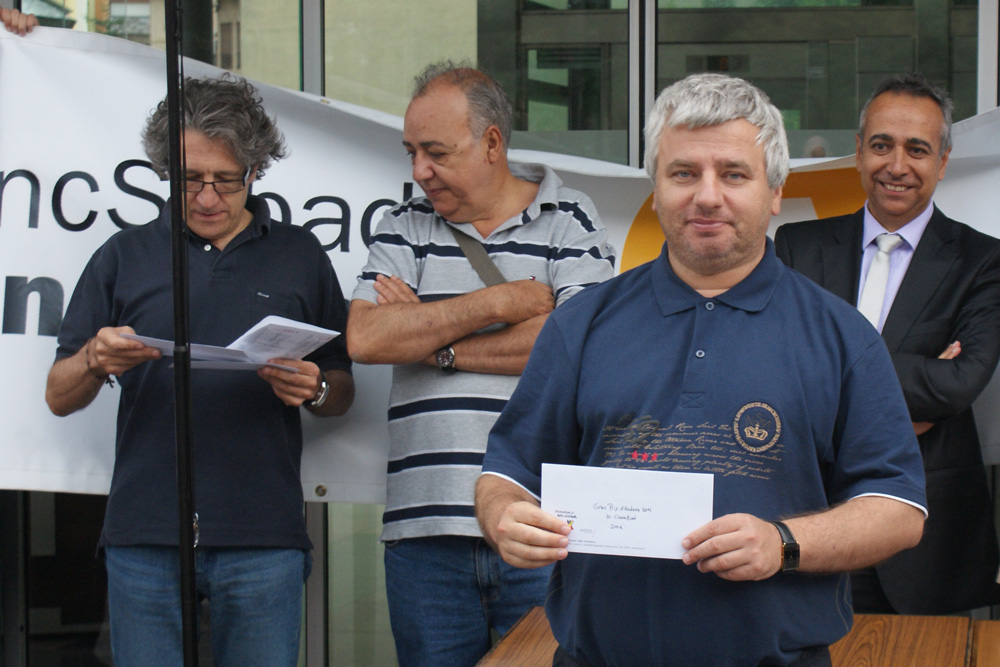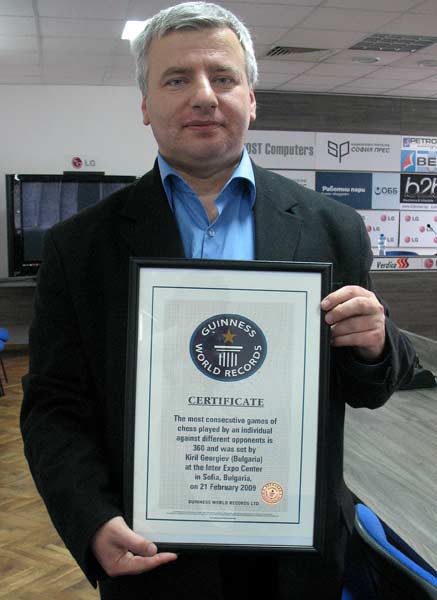Vera Jürgens: Kiril, when you were 18 you became World Champion U20, and after that public and media in Bulgaria celebrated you like a pop star. Today, 34 years later, you are still traveling the world to take part in chess events as dyed-in-the-wool chess professionals should do. But imagine you would be 18 again — would you again choose to become a chess professional?
Kiril Gerogiev: I remember that time well. I won the World Championship with a result of 11½/13 — a record that still holds. I left Short, Bareev, Salov, Dlugy, Milos, and other strong players behind me. For Bulgaria my success came as a big surprise. I later found out that the Bulgarian Chess Federation expected me to finish around place 20. And if I were 18 again I definitely would choose to become a chess professional. I was lucky because I could turn my hobby into a profession. In fact, when I was 14, I decided to dedicate myself primarily to chess. With 15 I moved to a bigger city (Pernik) and started to practise daily and intensively and to play more tournaments.
How many days of the year are you traveling?
I do not keep exact statistics but I am traveling about four to six months a year. That is quite common. The job of a chess professional requires it. There are tournaments which are enormously important and which a chess professional should not miss: European and World Championships, the World Cup, invitational tournaments, strong open tournaments, team championships.
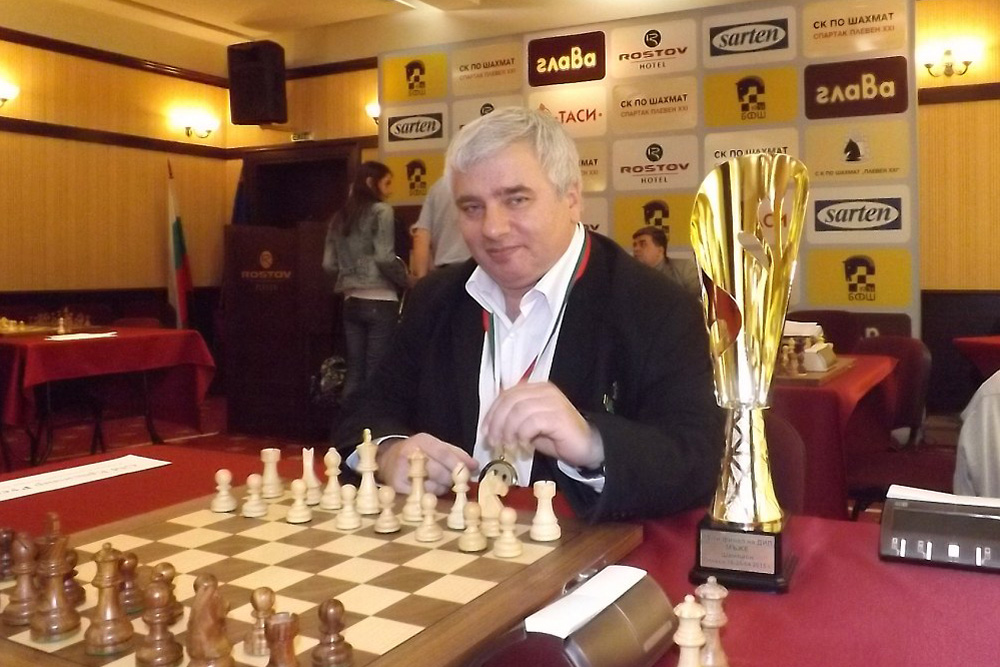
Kiril Georgiev, six-time National Champion of Bulgaria | Photo: Kiril Georgiev
In the 80s people in Bulgaria called you "a living encyclopedia". The times were different, there was no internet and chess computers were weak. Chessplayers used thick books like the "Encyclopedia of Chess" or the "Chess Informants" which you knew inside out because of your excellent memory. Today, computers reign the chess world and there are databases with millions of games. How do you feel about this development? Do you sometimes feel nostalgic about the computer-free time of the 80s?
It's true, when I was nine years old I already studied Russian chess books from cover to cover. My father, Dimitar Georgiev, helped me. He was a strong chessplayer and he taught Russian. Back then, I invested days and weeks to find and to order games about a certain line. But I do not feel nostalgic about these times because today computers allow you to have fast access to high quality information. However, there is a downside to it: the technology of the computer "harms" chess a little because a lot of variations and entire openings are analysed to death. The game dries out a bit.
Let us talk about chess in your country. Bulgaria has a great chess tradition and brought forth two World Champions, Veselin Topalov and Antoaneta Stefanova. Bulgaria also won many junior titles. Topalov and Stefanova still belong to the world's top players but the Bulgarian Chess Federation does no longer exist for FIDE and Bulgarian chessplayers are forced to play under the flag of the European Chess Union. What happened?
In the last decades chess in Bulgaria has had a lot of success. Unfortunately, from 2011 to 2014 employees and board members of the Bulgarian Chess Federation (BCF) embezzled large amounts of money. In the last three years the BCF has been the target of numerous inspections by the board of control and the department of public prosecution. This embezzlement is well documented, in papers published by various official channels such as the ministry for youth and sport, the European Chess Union and FIDE.
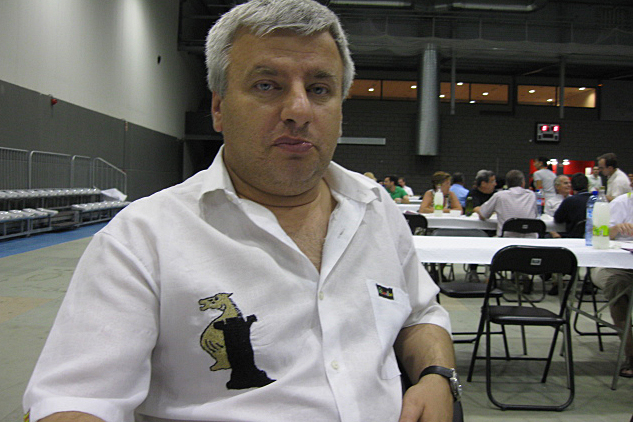
In 2016 the BCF refused to submit the requested documents for this period. The BCF also refused all cooperation and a statement about opening a special account in the U.S. State of Delaware. But it is a fact that the BCF transferred large sums of money to this special account and not to the official bank account of the European Chess Union in Switzerland.
Minister Krasen Kralev asked the BCF to reimburse the missing sum of more than one million euros to the ministry of sports. This did not happen, and as a result and after an order of the ministry the licence of the Bulgarian Chess Federation was withdrawn on August 10th, 2017. This led to an automatic licence withdrawal by the FIDE — another heavy blow.
Now Bulgarian chessplayers can only play under the flag of FIDE. The Bulgarian Chess Federation re-established itself under the name BSB 1928. Unfortunately, people from the old chess federation and many friends of the former president and executive director are part of the new federation. This chess federation does not really inspire confidence, neither in Bulgaria nor at the ECU or FIDE. Interestingly, many believe that the people who inflicted enormous damage on the Bulgarian players and chess clubs would get a licence for their re-establishment of the BCF.
Is there hope for a positive development? Will Bulgaria send a men's and a women's team to the Chess Olympiad 2018 in Batumi?
In April 2016 two chess fans and I founded the Bulgarian Chess Union 1931 which sees itself as a kind of opposition to the BSB 1928. 12 chess clubs which were unhappy about the work of the BCF quickly followed us. We soon counted 20 clubs. The president of the BSU 1931 — Dobri Belivanov — is mayor of the city of Chaskowo and a strong chess master. We hope that the BSU 1931 will get a national licence and will unify all Bulgarian chess clubs. We fight for clear rules and for the transparency of the Bulgarian chess organisations. We demand a complete clarification of the embezzlement by the BSB and the resignation of the entire former board and the executive director.
It is still too early to say whether Bulgaria will play in the Chess Olympiad 2018 but should the BSU 1931 get the licence we will normalise chess life in Bulgaria.
In 2009 you set a record in simultaneous play by playing 360 games. You won 284, drew 70, and lost only 6. An impressive result. How many kilometers did you cover during this simul? And how did you keep your energy?
I prepared intensively for two months, mainly focusing on endurance training. I often visited my gym, I took long walks in the woods, went swimming and had massages. During this simul I walked about 20 kilometers in 14 hours and 15 minutes. From time to time I had short 10-minute breaks. I drank water, juice and coffee.
Do you have the ambition to break the new record in simultaneous chess — 500 boards?
No. The nervous tension is much too high, moreover, this would require a long-term intensive preparation.
At the World Cup 2017 in Tbilisi Anton Kovalyov was asked to change his "winner's shorts", with which he had played in the first and the second round. This led to a controversy after which Kovalyov immediately left the tournament. What do you think about this? Did Kovalyov react correctly?
When I played in the World Cup the contract included a "dress code" clause which obliged the players to wear long trousers, jacket and shoes. I don't know which clause the new contracts include but I think that every self-respecting chess professional should adhere to the rules and should take care of a proper appearance.
What would you change in chess if you had the power and the means?
I would declare war on cheating, and strengthen all controlling and other measures to fight cheating. I would welcome it if the use of electronic devices during a tournament game would be seen as a criminal offense. I believe that the organisers of strong chess events should invest more into controlling systems.
Who do you think is the best player of all time?
A difficult question. I believe that every world champion has a greatness of his own. From the world champions of the past I would like to single out Fischer, Karpov, and Kasparov because their play comes closest to the modern chess of today. In regard to the old champions — I learned a lot from the creations by Akiwa Rubinstein.
Top players such as Kasparov, Zsuzsa and Judit Polgar withdrew from tournament chess when they were about 40 to go into politics or coaching. How about you?
I still like to play tournament chess but I recently also took up coaching. I also write chess books. In the center of Sofia we opened the chess club "Blitz" which offers regular training units with players of all levels. I also supported my hometown Petrich to revive the local chess club. They started to work regularly with kids who are keen on chess. And soon there will be a "Kiril Georgiev" school of chess.
You are happily married for about 30 years. Your wife is a Bulgarian chess player, you have two adult children and two grandchildren. How important is family in your life? What do you think — is it an advantage if the wife of a grandmaster also plays chess?
My family is the cornerstone and the motor of my activities. Emilia and I have been married since 1989. She studied sports at the "G. Dimitrov" college with a focus on chess. My wife knows the difficulties of being a chess professional and fully supports me. From time to time we travel and play together. Emilia is also my personal driver. I do not have a driver's licence.
How does a chess professional live in Eastern Europe? Was it previously easier to live from chess?
For chess professionals it is indeed more difficult today. I would think the main reason for this is the worldwide economic crisis. Conditions for open tournaments get worse. Round-robins for players between 2600-2650 are a rarity now and these circumstances will force me sooner or later to coach.
Right now, it's chaotic in Bulgaria: there are no national teams, no grants and no salaries. The best chess players in Bulgaria would not get an old age pension for their achievements in chess — unlike chess players in Serbia, Macedonia, Bosnia and Herzegovina or Montenegro. In the past it was easier to live from chess. Players received salaries and grants. The state paid traveling expenses, training camps, benefits, etc.
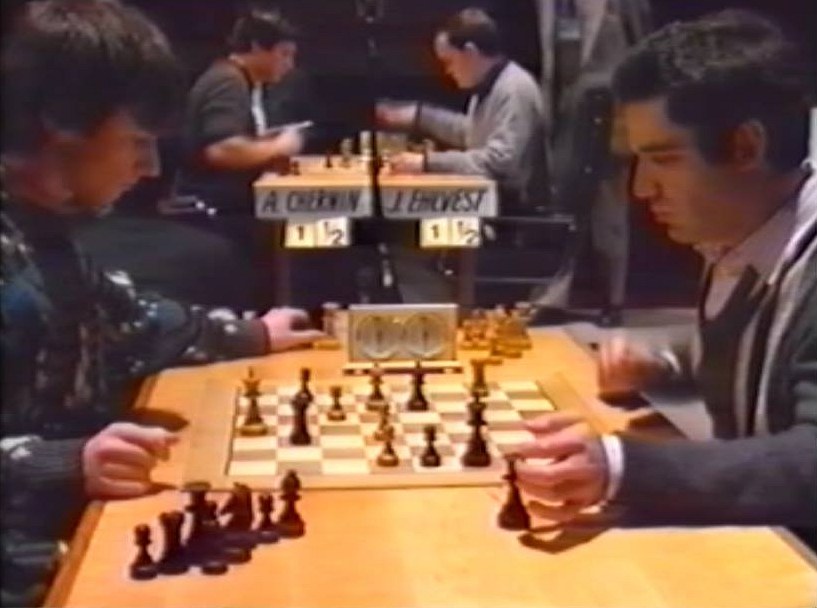
Which of your successes do you remember particularly well?
My blitz-match with Kasparov in 1988, which I won 3-1. I also scored wins against almost all top players and I am proud of those wins.
Are there other events from your chess life which you remember particularly well?
In 2006 my wife expressed the wish to have a new car. I told her, "Let me first play in Gibraltar, if I come first, you will get the car". I was extremely motivated and came clear first with 8½/10. When I came home I immediately kept my promise.
Williams main teaching method behind this set of two DVDs is to teach you some simple yet effective set ups, without the need to rely on memorising numerous complicated variations.
Kiril, thank you very much the interview. And lots of success for your chess career!
Thank you!
Translation from German: Johannes Fischer
